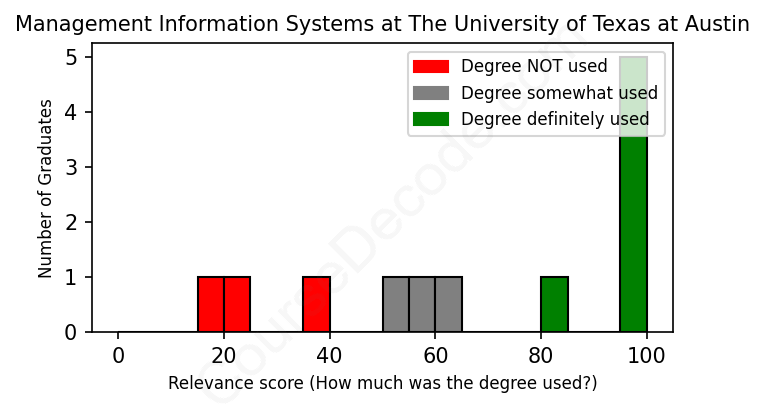
First, some facts. Of the Management Information Systems graduates from The University of Texas at Austin we've analyzed , here's how many have used (or NOT used) their degree in their career:

These are estimates based on AI analysis of 12 LinkedIn profiles (see below).
The verdict? Slightly above average. Overall, with an average relevance score of 68%, Management Information Systems graduates from The University of Texas at Austin have a slightly higher likelihood (+1%) of finding work in this field compared to the average graduate across all fields:
And for comparison, here's the chart for all profiles we've looked at across all degrees.
Also, after graduating, only 16% of these graduates have pursued further education other than another Bachelor's degree (such as a Masters degree or other), compared to the average across all profiles of 35%. This suggests a Bachelors degree is enough for most Management Information Systems graduates, and it's normal to look for work straight after graduation.
See the details:
|
Relevance score: 19% We think this person has NOT gone into a career related to their degree. We think this person has NOT gone into a career related to their degree.
DEGREE INFOGraduated in 2020 from The University of Texas at Austin with a Bachelor of Business Administration - BBA in Management Information Systems. No other secondary education since. JOB HISTORY SINCE GRADUATIONArt Director Coyote Agency Apr 2021 - Jun 2021 Business Systems Analyst, ARM (Asset & Resource Management)  CGI Jun 2020 - Sep 2021 Business Systems Analyst, ERP (Enterprise Resource Management)  CGI Sep 2021 - Dec 2021 Digital Designer  Barron By Design Jan 2021 - Present Digital Designer  Punahou School Jan 2022 - Present ABOUTHi! My name is [NAME REMOVED] Barron, and I graduated from The University of Texas at Austin with a degree in management information systems and a minor in supply chain management. I'm passionate about digital design, business consulting, and UX/UI. Currently, I own and operate, Barron By Design, my digital design company that focuses on brand identity, web design, and content creation for new and seasoned business owners alike. I'd love to chat over coffee about any opportunities that diverge my love for technology, business, and design.In my free time, you can find me playing with my dog, preparing for the next local marathon, or planning my next travel destination. |
The top 10 most common jobs done by the graduates we've analyzed (ranked most common to least) are:
From what we've seen, a lot of graduates from the Management Information Systems program at The University of Texas at Austin end up in roles that either touch on technology management or completely miss the mark. Many of them have taken jobs at Accenture, where they seem to bounce around different analyst and manager roles. Positions like Digital Consultant and Strategy & Consulting Senior Manager show a clear link to utilizing skills from their degree, especially around applying digital strategies and managing information systems. However, there are also many roles, like Marketing Specialist or Senior Vice President at a bank, where the connection to Management Information Systems is pretty weak.
When looking at the bigger picture, it seems like there's a mixed bag of job relevance. Some graduates land roles that directly use their MIS skills, especially in technology-driven environments where analysis and management are key. Others find themselves in various positions that don’t really need their specific training in information systems, focusing more on general management or customer service. Overall, it seems like the connection to Management Information Systems varies a lot, with some graduates using their degree directly, while others pursue paths that straddle the line of relevance.
Here is a visual representation of the most common words in job titles for Management Information Systems graduates (this is across all Management Information Systems graduates we've analyzed, not just those who went to The University of Texas at Austin):

Graduates from The University of Texas at Austin with a degree in Management Information Systems typically go on to have strong career trajectories, especially in technology and consulting sectors. For a lot of these individuals, their first job after graduation often involves roles like analyst or consultant at major firms such as Accenture or Bank of America. This entry-level experience typically helps them build a solid foundation in both technical and analytical skills, which is crucial in the fast-paced world of business technology.
As these graduates progress in their careers, often within a few years, many move up the ladder to more senior roles. It’s not uncommon to see them transition from junior analysts to senior managers or even executive positions within large organizations. For instance, several graduates from 2012 to 2022 have continuously climbed the ranks in consulting firms, tech companies, or even started their own ventures, which shows a good mix of stability and entrepreneurship in their career paths. Overall, it seems that a degree in Management Information Systems from UT Austin paves the way for fulfilling careers in fields that are both relevant to their studies and in high demand, especially as tech continues to advance.”
Honestly, a Bachelor’s degree in Management Information Systems (MIS) at The University of Texas at Austin can be challenging, but it really depends on your background and interests. The coursework usually dives into both business and tech, covering topics like databases, programming, and systems analysis, which means you need to juggle some math and analytical thinking with business concepts. For someone who enjoys problem-solving and has a knack for technology, it might feel more manageable, but if you're not super into those areas, it could be a bit tougher. Overall, it’s about average in terms of difficulty compared to other business-related degrees, but the rigor of UT Austin’s program might push you to work a bit harder than other schools. Just stay organized and seek help when you need it, and you'll get through!
Most commonly, in the LinkedIn profiles we've looked at, it takes people 4 years to finish a Bachelor degree in Management Information Systems.
From looking at these graduates from The University of Texas at Austin, it seems like a mix of opportunities and earnings, but overall, many of them are doing pretty well. The one with a long career at Accenture climbed the corporate ladder to Senior Vice President, which definitely suggests a healthy paycheck, likely in the six figures. Another grad dabbled in entrepreneurship and held some solid sales roles, which can also be lucrative, especially if the business takes off. But not everyone is on that track; some have roles like a Bilingual Advocate or Service Representative, which usually don't pay as much. Still, even those recent grads in tech positions seem to be setting themselves up for decent earnings. So, while there's definitely a range, it looks like most of these people have the potential to make decent money over time if they keep progressing in their careers.
Here is a visual representation of the most common words seen in the "about" section of LinkedIn profiles who have a Bachelor degree in Management Information Systems (this is across all Management Information Systems graduates we've analyzed, not just those who went to The University of Texas at Austin). This may or may not be useful:

Here are all colleges offering a Bachelor degree in Management Information Systems (ordered by the average relevance score of their Management Information Systems graduates, best to worst) where we have analyzed at least 10 of their graduates:
| College | Score | Count |
|---|---|---|
 The University of Alabama The University of Alabama
|
93 | 18 |
 The University of Georgia The University of Georgia
|
84 | 12 |
 University of South Florida University of South Florida
|
83 | 10 |
 University of Alabama University of Alabama
|
83 | 19 |
 San Jose State University San Jose State University
|
79 | 16 |
 University of Maryland Baltimore County University of Maryland Baltimore County
|
79 | 10 |
 University of Georgia - Terry College of Business University of Georgia - Terry College of Business
|
77 | 18 |
 University of Arizona University of Arizona
|
76 | 14 |
 Penn State University Penn State University
|
73 | 11 |
 Ohio University Ohio University
|
73 | 10 |
 Oklahoma State University Oklahoma State University
|
73 | 17 |
 Baylor University Baylor University
|
73 | 12 |
 University of Houston, C.T. Bauer College of Business University of Houston, C.T. Bauer College of Business
|
73 | 20 |
 Texas A&M University Texas A&M University
|
70 | 10 |
 The University of Texas at Austin The University of Texas at Austin
|
68 | 12 |
 University of Houston University of Houston
|
68 | 19 |
 East Carolina University East Carolina University
|
64 | 11 |
 Washington State University Washington State University
|
64 | 14 |